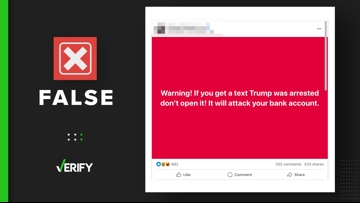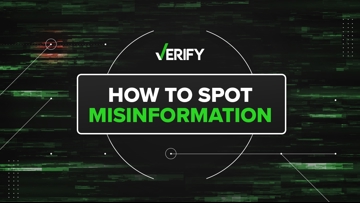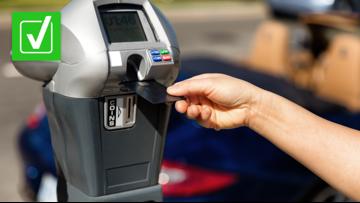Many legitimate companies and organizations use paid surveys to conduct market research, get feedback on their products and services, or get a better understanding of their customers. But VERIFY viewer Carolyn wants to know if there is a way to spot the real paid surveys from the fakes.
“Are paid surveys a scam? I keep receiving emails regarding them and I am not sure if this is a valid way to earn extra income,” Carolyn recently asked VERIFY in a text.
Here are five VERIFIED ways to identify and avoid a paid survey scam.
THE SOURCES
- Better Business Bureau (BBB)
- AARP
- Kaspersky, an international cybersecurity company
- Jake Wilson, cyber security evangelist at Western Governors University
WHAT WE FOUND
Paid survey scammers use phony surveys to phish for people’s personal information in an effort to steal their identities. They often lure people in by promising cash, gift cards or tech gadgets for their participation, but they are really trying to acquire people’s names, addresses or banking information, according to the Better Business Bureau (BBB) and Kaspersky.
“Even if it's minuscule and just seems limited; maybe they're asking little bits and pieces — but once all that information is combined, they could create a pretty good profile of an individual and use that information to potentially steal somebody's identity,” Jake Wilson, cyber security evangelist at Western Governors University, told VERIFY.
More from VERIFY: Yes, unsolicited texts offering money for putting advertisements on cars are scams
Wilson says paid survey scammers typically reach out to people through text, email or over the phone. Some even create online ads or social media posts, inviting people to participate in polls or questionnaires for cash, AARP writes on its website.
Paid survey scam red flags
Cybercriminals and scammers typically use a variety of ways to entice people into filling out their phony surveys. The BBB shares several tips on how to spot red flags on its website:
- Look for a too-good-to-be-true reward. If a survey offers you a $100 gift card or a 90% discount for answering three quick questions, it’s probably a scam.
- The survey heavily promotes the chance to win a reward. Real surveys are a way for a company to gather information from its customers. They may offer a small discount to encourage participation, but the reward is not the focus.
- The survey doesn’t state who is running it and what’s the purpose. Real surveys will be very direct about the brand involved, the type of information requested and what it’s being used for. If this isn’t provided, don’t continue.
- Watch for survey questions or gifts that don’t match the business the survey is from. If the survey claims to come from a grocery store chain but mentions a “free gift” of clothing and jewelry, that’s a red flag. Scammers like to mix and match brands, images and survey language from multiple companies.
- Watch for limited-time offers. Scammers typically try to push you into action before you have had time to think. In the case of surveys, scammers may try to tempt you with limited free gifts.
“Be cautious of the websites you're visiting. Only visit reputable websites, do some research, look at the reviews and things like that before you take action on any of these potential paid online surveys,” Wilson said.
More from VERIFY: Did you get an offer for a government grant without applying for one? It’s a scam.
How to tell a paid survey website is legit
Although scammers try their hardest to fool people into sharing their personal information through their phony surveys, there are ways to tell whether a paid survey is legitimate or fake, according to Kaspersky. The international cybersecurity company shares ways to determine whether the site is legit, including the following:
- Check for reviews online. Check legitimate review sites such as Google or Trustpilot for reviews of the online paid surveys website. You can also check the ratings of the site on BBB’s website.
- Read the privacy policy. Find the website's privacy policy and read it carefully. The privacy policy should tell you whether your information is going to be sold to spammers or if it's going to be kept confidential.
- Don’t give away too much personal information. Pay close attention to the information you are providing. Trust your instincts. If any of the information requirements seem strange, avoid completing the rest of the form and simply leave the site.
“It's important to find out what these companies are going to do with your information. Are they selling it to a third party? What type of information are they gathering? Where does it go afterward? What did they have in terms of cybersecurity in place? It's important to take all that into account before just going out freely giving up sensitive information,” Wilson said.
Where to report a paid survey scam
If you or someone you know was the victim of a paid survey scam, you can file a report online with the Federal Trade Commission (FTC), or call them at 877-382-4357. You can also report paid survey scams to the FBI’s Internet Crime Complaint Center or the BBB’s Scam Tracker.
More from VERIFY: 6 ways to spot a mobile payment app scam












